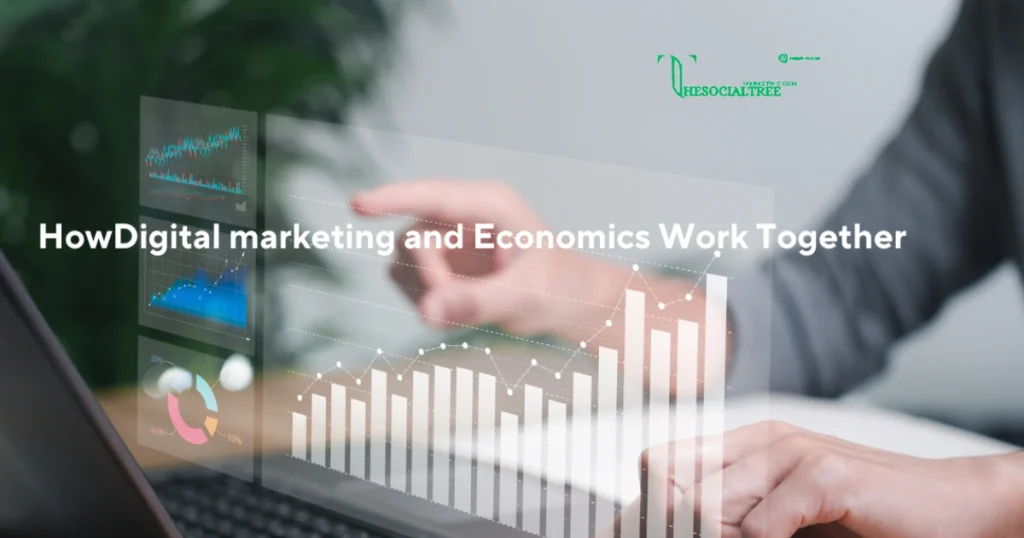Table of Contents
ToggleHow is digital marketing related to economics?
Let us dig into how digital marketing and economics are related. It is pretty easy to understand!
- Digital Marketing
Digital marketing is all about using the internet to get your attention. Think of those ads you see on Instagram or those special discount emails you get. Companies use these to expose their brand and make you want to buy.
- Economics
Economics is about understanding how people and businesses buy and sell things. Plus, it is about deciding how much goods to make and how much to charge based on how many people want it.
How They Work Together?
Here is how digital marketing and economics are connected:
1- Creating Desire
Let us discuss how digital marketing makes you want goods. Suppose you are scrolling and see an ad for a new gadget. The gadget looks nice in the ad. The ad captivates and gets you thinking, “I buy that!” It is all about getting you excited about the stuff.
When many people see these ads and think the same thing, that is all about creating demand.
It is like when everyone suddenly wants the latest phone, it sells very quickly. Companies watch how much people think about the product with the help of these ads and then decide how much to make. If they see interest, they will make more. If not, they might make fewer. So, those ads are necessary to understand what people want and how much to produce.
2- Pricing
Let us discuss how pricing works with digital marketing. You know those big sales and discounts you see online? Digital marketing helps companies produce these deals to get you to buy goods.
For example, they run ads for “20% off”!” The idea is to make the deal so appealing that you will get it.
When companies blow out these discounts, they hope more people will buy because of the deal. It is a way to match what they want to sell with what you want to spend.
So, by offering discounts and adjusting prices, companies ensure to get buyers while staying in line with what you are ready to pay.
3- Understanding Preferences
Let us discuss how digital marketing understands what you want. When searching online, digital marketing keeps track of what captivates you. It sees which ads you click on and what products you check out. It is like a friend that knows about your interests.
So, how does this help? Discuss it. When companies know what you are into, they can show you more of the goods you love. Companies might show you ads for the newest tech when you always look at cool gadgets.
This way, the ads you see are more relevant to you, making it easier for companies to match their goods with what you want.
4- Changing Shopping Habits
Let us discuss how digital marketing can change where you buy. Suppose you find a pretty cool online deal that you cannot avoid. Suddenly, you are buying stuff online instead of going to a store. That is where digital marketing is at work, making online shopping so appealing that you switch from the mall to your computer.
So, how does this affect businesses? When more people shop online, stores might observe fewer customers coming through their doors.
To keep up, some stores might see more on their online shops and even close some physical locations.
How Economic Factors Affect Digital Marketing?
Let us talk about how the economy affects digital marketing in a super simple way.
What Are Economic Factors?

Economic factors are the factors that impact how much money people have and how they use it. Think of them as the big things that affect your savings. They involve how well the economy is doing, how much people are making, and whether prices are going up or down.
Firstly, if the economy is good, people often have more money to use. Jobs are good, and businesses are making money. But if the economy is bad, people might have less money because jobs are short, and you are not doing great. It can make people less likely to spend a lot.
Secondly, there is how much people are earning. People are more likely to spend on stuff if they have money. But if they are earning less or worried about their job, they might be more careful with their spending.
And when prices are high, people have to pay more for goods, which can make them spend less. So, all these factors impact how people handle their money.
How Economic Factors Affect Digital Marketing

Let us dig into how different money situations affect digital marketing. Companies love to go big with their ads and use promotions and big offers to get your attention and make you think you cannot miss out if they feel people have more money. They want you to see their deals and think, “I have got to get this!”
However, Companies might decrease costly ads when you have less money and are worried about their income. Instead, they will try friendly ways to get noticed, like offering discounts. The idea is to attract buyers who are conscious of their money.
Secondly, inflation is another factor. It impacts a lot on shopping. When prices are high, companies might adjust their prices and run ads showing sales or special offers to show that their products are still worth it, even though everything is expensive. They want you to see that their deals are still valuable.
Thirdly, how people feel about their money also plays a crucial role. Companies might run more exciting ads when people are confident about their savings. But if people are worried, the ads will focus more on savings and deals to appeal to those who watch their spending.
Lastly, if interest rates are low, borrowing money is cheaper. It can lead people to buy more costly goods. Companies might offer special deals to take advantage of this. So, companies adjust their marketing based on how much money people have and what is happening with prices.
So, companies market their stuff changes based on these economic factors. They adapt their strategies depending on how much money people have, how they think about their savings, and what is happening with prices.
Example:
Suppose a company that sells gadgets. If the economy is good and people have savings, the company might run expensive ads and offer high-end features. If the economy is tough and people buy less, they focus on budget-friendly options and discounts.
So, economic factors change how companies do their digital marketing. When people have more money, companies go out with ads and deals. When times are bad, they focus on saving money and captivating careful buyers.
Conclusion:
Digital marketing and economics are nearly connected. Digital marketing helps create demand, set prices, and understand what people buy. It is all about making, buying, and selling. When you see an ad that gets your attention and a deal you cannot avoid, you see economics in action.
So, next time you notice a great deal or an ad, remember it is all part of the economy and marketing!

